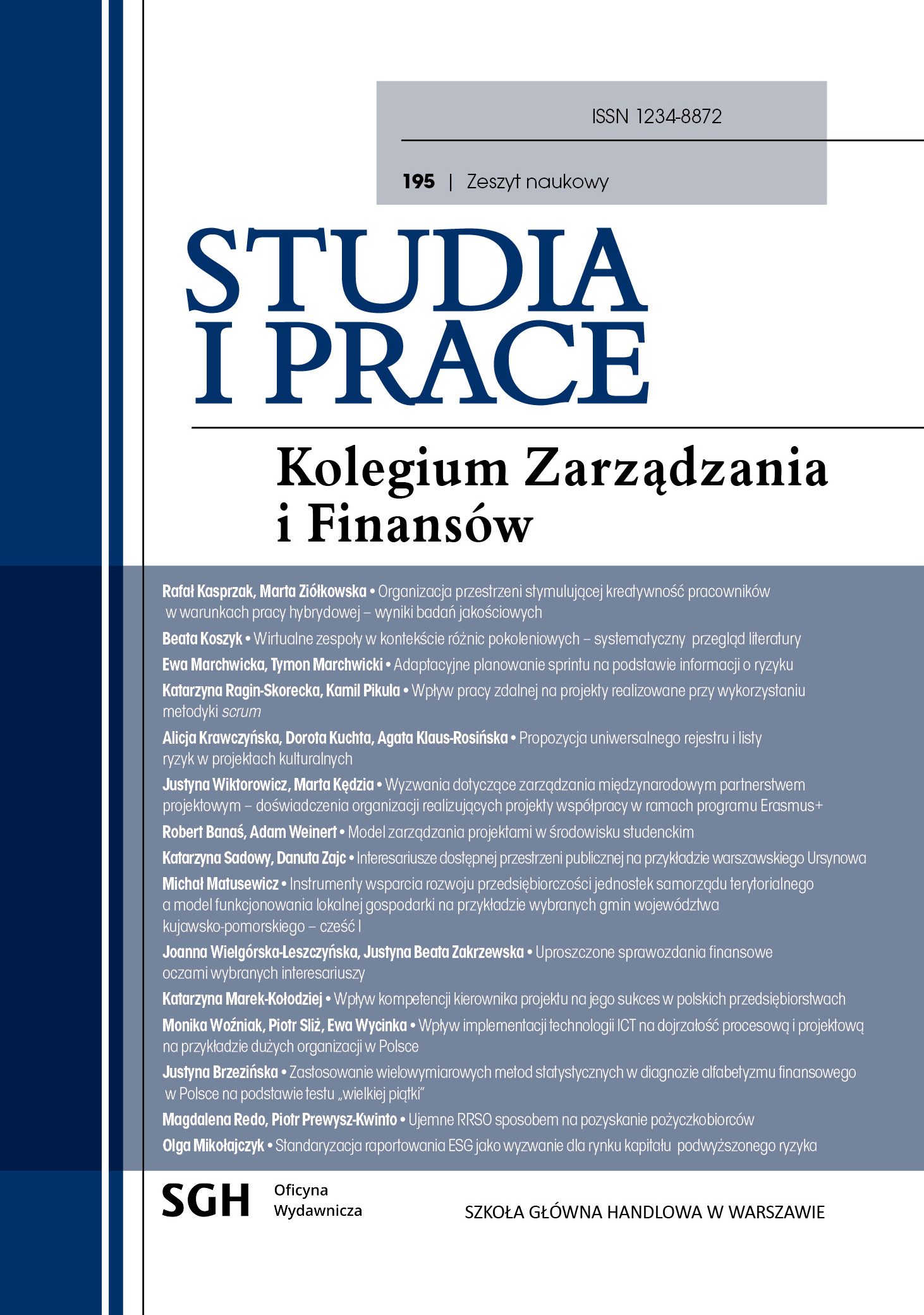Project approach to studying: a student project management model
DOI:
https://doi.org/10.33119/SIP.2023.195.7Keywords:
Project Canvas, project method, design thinking, design approach, project managementAbstract
The article is a continuation of considerations on the issue of the project approach in the educational process and student activities at universities in Poland. An attempt was made to identify and analyze solutions that support initiating, organizing, and presenting the results of discussions on undertaken projects in the academic environment. Based on the qualitative research conducted and the indicated implications for further work in the development of assumptions for innovation responding to the identified gaps, the authors developed a model containing methods for planning and managing student projects, based on generally recognized project management standards.
Downloads
References
Wydawnictwa zwarte
Bradley, G. (2016). Benefit Realisation Management: A Practical Guide to Achieving Benefits Through Change. London: Routledge.
Brzozowski, M. (2020). Wykorzystanie metodyk zarządzania projektami w świetle badań empirycznych. W: Wybrane aspekty zarządzania procesami, projektami i ryzykiem w przedsiębiorstwach. Łódź: Wydawnictwo Uniwersytetu Łódzkiego.
Brzozowski, M., Kopczyński, T. (2011). Zarządzanie projektami i zmianami w przedsiębiorstwie. Poznań: Advertiva.
Cabała, P., Wawak, S. (2022). Zarządzanie projektami. Zarys problematyki. Kraków: Wydawnictwo Uniwersytetu Ekonomicznego w Krakowie.
Demiryürek, K. (2023). Project Canvas in Entrepreneurship. Digital Resilience and Sustainable Entrepreneurship in the Time of COVID. Istanbul: EFE Academy Publishing.
Habermann, F., Schmidt, K. (2014). The Project Canvas. A Visual Tool to Jointly Understand, Design, and Initiate Projects. Berlin: Over the Fence.
Kerzner, H. (2017). Project Management: A Systems Approach to Planning, Scheduling, and Controlling. New York: John Wiley and Sons.
Kisielnicki, J. (2014). Zarządzanie projektami. Ludzie – procedury – wyniki (wyd. II). Warszawa: Oficyna a Wolters Kluwer business.
Kor, R., Bos, J., Tak, T. (2018). Project Canvas: Innovative Methoden für professionelles Projektmanagement. Berlin: Schäffer-Poeschel.
Merrow, E. W. (2011). Industrial Megaprojects: Concepts, Strategies, and Practices for Success. Hoboken: John Wiley and Sons.
Nieto-Rodriguez, A. (2021). Harvard Business Review Project Management Handbook: How to Launch, Lead, and Sponsor Successful Projects. Boston: Harvard Business Review Press.
Osterwalder A., Pigneur, Y. (2010). Business Model Generation – A Handbook for Visionaries, Game Changers, and Challengers. Hoboken: John Wiley and Sons.
PARP (2022). Prognozowane zmiany na rynku pracy. Przegląd scenariuszy. Warszawa: Instytut Analiz Rynku Pracy.
PMI (2021). The Project Management Body of Knowledge (PMBOK Guide 7). Newtown Square: Project Management Institute.
Radoła, M., Weinert, A., Wójtowicz, Ł., Banaś, R. (2021). Podejście projektowe do studiowania w Polsce – stan obecny i identyfikacja trendów. W: Międzynarodowa innowacyjność i konkurencyjność w XXI w. Aspekty innowacyjne, Ł. Wójtowicz, P. Woźniak (red.). Radom: Instytut
Naukowo-Wydawniczy „Spatium”.
Schibi, O., Lee, C. (2015). Project Sponsorship: Senior Management’s Role in the Successful Outcome of Projects. Project Management Institute.
Smith, P., Derry, S. (2012). Zarządzanie projektami. Warszawa: MT Biznes.
Trocki, M., Grucza, B., Ogonek, K. (2009). Zarządzanie projektami. Warszawa: PWE.
Trocki, M., Bukłaha, E., Grucza, B., Juchniewicz, M., Metelski, W., Wyrozębski, P. (2012). Nowoczesne zarządzanie projektami. Warszawa: PWE.
Artykuły naukowe
Chipulu, M., Ojiako, U., Gardiner, P., Williams, T., Mota, C., Maguire, S., Ojiako, U., Shou, Y., Stamati, T., Marshall, A. (2014). Exploring the Impact of Cultural Values on Project Performance: The Effects of Cultural Values, Age And Gender on the Perceived Importance of Project Success/Failure Factors, International Journal of Operations and Production Management, 34 (3), s. 364–389.
Fridgeirsson, T. V., Ingason, H. T., Jonasson, H. I., Jonsdottir, H. (2021). An Authoritative Study on the Near Future Effect of Artificial Intelligence on Project Management Knowledge Areas, Sustainability, 13 (4).
Habermann, F. (2014). Der Project Canvas – eine gemeinsame Sprachplattform für Business und IT, HMD Praxis der Wirtschaftsinformatik, 51, s. 568–579.
Huemann, M., Keegan, A., Turner, J. R. (2007). Human Resource Management in the Project-Oriented Company: A Review, International Journal of Project Management, 25 (3), s. 315–323.
Matinheikki, J., Artto, K., Peltokorpi, A., Rajala, R. (2016). Managing Inter-Organizational Networks for Value Creation in the Front-End of Projects, International Journal of Project Management, 34 (7), s. 1226–1241.
Pierścieniak, M. (2016). The Business model Canvas – narzędzie zarządzania dla start-upów, Przedsiębiorstwo i Region, 1, s. 56–64.
Porter, M. E., Kramer, M. R. (2011). Creating Shared Value, Harvard Business Review, 89 (1/2), s. 62–77.
Rzempała, J., Wiśniewski, T. (2019). Poziom kompetencji studentów w zakresie zarządzania projektami na uniwersytetach i uczelniach technicznych: przypadek Programu IPMA-Student, Przegląd Organizacji, 3, s. 58–69.
Thomas, G., Fernández, W. (2008). Success in IT Projects: A Matter of Definition?, International Journal of Project Management, 26 (7), s. 733–742.
Urbanowska-Sojkin, E., Weinert, A. (2016). Rozwój koncepcji CSV na kanwie krytyki społecznej odpowiedzialności biznesu, Przegląd Organizacji, 6, s. 31–36.
Weinert, A., Banaś, R. (2023). Podejście projektowe do studiowania – identyfikacja i analiza potrzeb interesariuszy oraz rekomendacje dla uczelni w Polsce, Studia i Prace Kolegium Zarządzania i Finansów, 189, 63–73.
Materiały internetowe
Van Aken, T. (2023). Das Project Canvas – Ziel und Rahmen für Ihr Projekt, http://blog.sybit.de/2013/04/project-canvas-ziel-und-rahmen-fuer-ihr-projekt (dostęp: 22.11.2023).
Downloads
Published
How to Cite
Issue
Section
License
Copyright (c) 2024 Studies and Work of the Collegium of Management and Finance

This work is licensed under a Creative Commons Attribution 4.0 International License.









